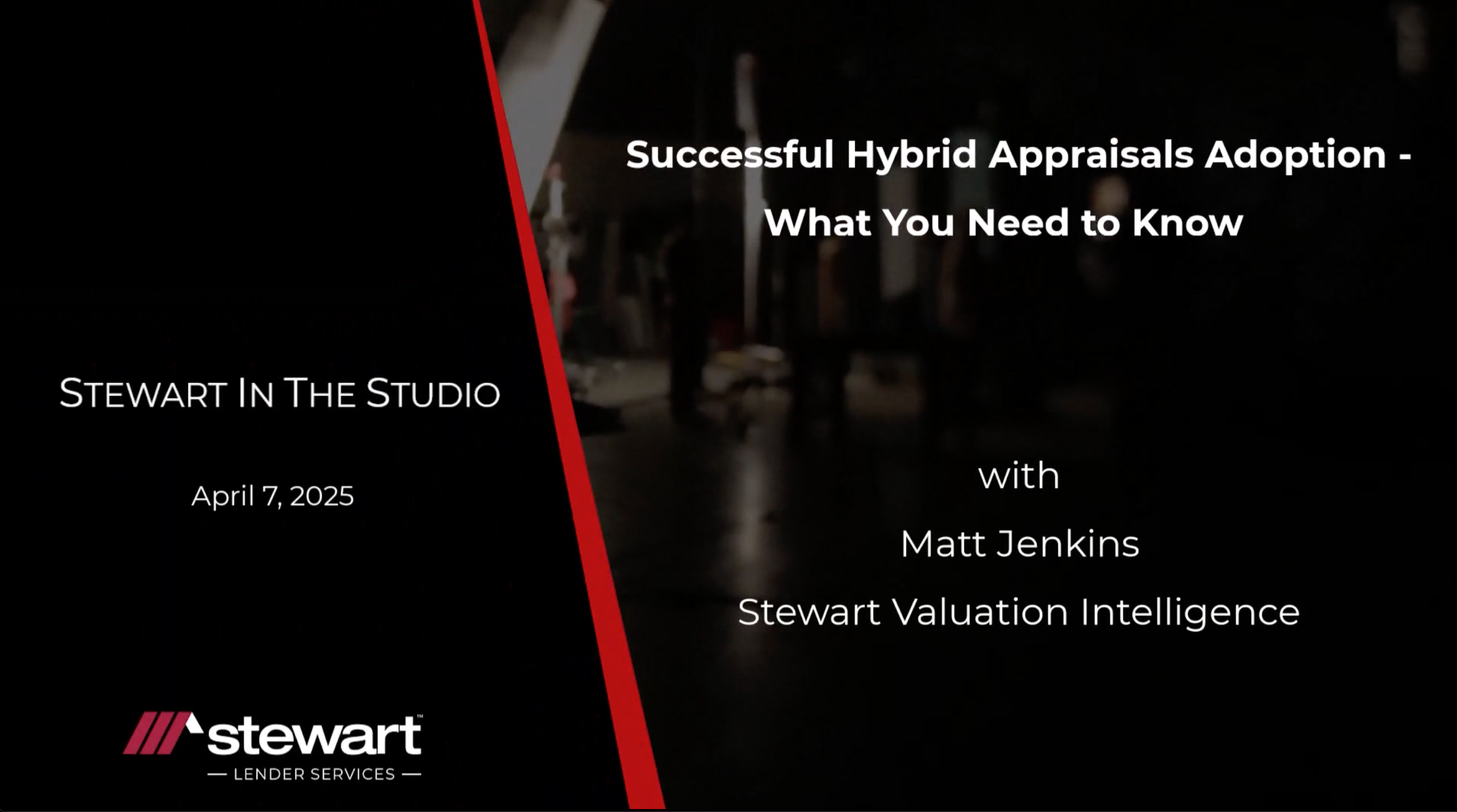Stewart in the Studio
Successful Hybrid Appraisals Adoption
Embracing hybrid appraisals is not just an upgrade—it’s a game-changing move that sets a new standard for efficiency and accuracy in property valuation. Lenders can partner with SVI to seamlessly integrate hybrid appraisals into their workflows, ensuring a competitive edge while delivering exceptional borrower experience.
To speak to a Stewart Lender Services expert, please fill out the form to the right – we will get back to you shortly.
Stewart in the Studio Form

Episode Notes
- The appraisal industry is undergoing significant modernization with the introduction of hybrid appraisals.
- These appraisals combine property data inspections by trained third parties with desktop appraisals, enhancing scalability, data standardization and accuracy.
- SVI leverages its vetted network of real estate professionals and proprietary technology to deliver high-quality hybrid appraisals. Their Validity Pro application ensures thorough inspections, utilizing AI tools for accuracy and efficiency.
Speaker Bios
Speakers for this episode include:

Marvin Stone
As Senior Vice President, Director of Strategic Initiatives for Stewart Lender Services, Marvin Stone is working on the digital transformation of the transaction process for Stewart’s full range of services that cover the entire mortgage lifecycle. He also contributes to industry technology by participating in MBA’s MISMO Title and Settlement Community of Practice and being part of Stewart’s generative AI council.
Stone has been with Stewart since 2007 and has managed various technology, process and compliance initiatives for the direct, agency and centralized title divisions. Before joining Stewart, he was CIO for a large title company on the West Coast and held strategic roles with other national underwriters and mortgage lenders.
Stone is a frequent speaker at industry events and is sought out for his commentary on industry trends.

Matt Jenkins
Matt Jenkins is the Vice President of Valuation Services at Stewart Valuation Intelligence, where he leads the company’s efforts in delivering top-tier valuation services. With over 20 years of experience in the real estate valuation industry, Matt has been a key figure in driving operational excellence, client satisfaction and strategic growth within the organization.

Episode 18 Transcript
View Full Transcript
E18: Successful Hybrid Appraisals Adoption
Marvin: Matt, can you give us a little history on where we are now, the backstory and how we got here?
Matt: Sure. So yeah, the valuation landscape’s undergoing a pretty significant transformation, and that’s really driven by the GSEs push for modernization, hybrid appraisals and property data inspection to modernize the process and try to add scalability, data standardization and accuracy. So that’s been underway for a number of years. And you know what I can say there is that we’ve already seen a big shift post the property data inspections a couple of years ago for the inspection based waivers. And those are working great. The data is very strong. And after that, come March 22nd on 2025, Fannie Mae expanded their hybrid appraisal policy to really affect the industry and drive scalability. That is what I see as the primary goal. It’s game changing in my opinion. And Freddie Mac is expanding their policy on April 7th, so the timing is good. To me, it’s a sets a new standard for efficiency and accuracy. The property data inspection is a very rich inspection
and, it awards the appraiser of a very thorough, inspection and a good view of the property. So all things in play, the push towards appraisal modernization and hybrid appraisals is in motion.
Marvin: Yeah. So, if I’m a lender today, what I am hearing is I’m going to get my appraisal faster.
Matt: So today’s environment, with lower volume the appraisal turn times are very strong, which is posing some challenges to, for lenders to move towards this hybrid appraisal space.
I would push lenders to go into this space and experience the hybrid appraisal and get ready for it. The big improvement is when the volume increases. And we saw that during the 2020 to 2022 phase when turn times were two plus weeks, sometimes even longer and it was a capacity issue for appraisers.
So, the capacity issue for the appraisers was pretty detrimental to the industry. It created a borrower issues. It created customer service issues and overall management issues of the process. So if you introduce the property data inspection remove the drive time and remove the inspection time for the appraiser, you automatically open up scale. But you can only do that when the property data inspection is built to a strong standard. The data collected is standardized, like I just said, and it’s very robust. So there’s no corner of the house that’s not viewed. There’s no condition that’s not reported on, and it
produces a very good floor plan. So it gives the appraiser enough that they can move forward with a hybrid appraisal with very strong inspection data.
Marvin: Okay. And just to level set hybrid appraisals, let’s just talk about what exactly are hybrid appraisals and how do they differ from a traditional desktop for instance?
Matt: Sure. So a hybrid appraisal pairs property data inspection by an uninterested third party. So we utilize brokers, agents, and appraisers throughout the country to conduct that property data inspection. They’re highly trained, vetted with an annual background check. It pairs that property data inspection with an appraiser that’s going to conduct a hybrid appraisal from their desktop. So that hybrid appraisal is a 1004 hybrid or 70 H or could be a condo, and that’s what the, or PUD, that’s what the appraiser will do without having to go view the property and spend that time doing the inspection, relying on a very robust property data inspection.
Marvin: Okay. So that makes sense. And so how does a lender actually order a hybrid appraisal?
Matt: So the lenders need to ensure that their platforms are set up to support hybrid appraisal. So that would be the first step that I would take. Most of our lending partners have already undergone that, process in their operating platforms. Ensure that they work with a partner like SVI that can support both the property data inspection and the hybrid appraisal, and has panels on both sides that can support that ensure that they’re utilizing a property data inspection that’s been verified by both GSEs, Fannie Mae and Freddie Mac, and then undertake the process with the approvals from the GSEs, the approval that you can move forward with a hybrid appraisal. And once you can move forward with a hybrid appraisal, so execute that order that will produce both the property data inspection, subsequently submit it over to the appraiser to complete the hybrid appraisal and everything will flow back through, the proper systems with the, proper quality and feedback systems.
Marvin: It sounds fairly easy, really. It doesn’t sound like it’s overly complex. SVI, I know is a verified provider of property data inspections and hybrids, is it the same everywhere or is there a difference with Stewart Valuation that lenders might not see with others?
Matt: We’re pretty proud of our process for what we call Validity Pro, which is our data inspection application to support inspection based waivers and hybrid appraisals. Since nine, since the 1990s, early 1990s, we have had a broker and agent panel that has primarily done property condition reports, broker price opinions and evaluations, and they’re highly vetted. We have a tremendous amount of experience with them, and we were able to go to that panel and bring into our property data inspection panel our performers, those who were committed to the progress in the industry, those who understood what problem we were trying to solve in the industry was trying to solve and interested, and eager to be part of the next phase of valuation, modernization and appraisal modernization.
So we have a captive audience and they enjoy working with us. And we have been scoring their performance and driving performance based assignment for decades. So we know who’s good and we know who we can send into a property. So we went in that direction because we were concerned about ethics, integrity, and how the lender and how Stewart was going to be represented. When you’re in somebody’s home, either with a borrower or with a real estate agent for upwards of 45 minutes to an hour, depending on the complexity of the home and what that inspection looks like. So that was our first approach, making sure that we built great training and that we highlighted and targeted our top performing agents, brokers and appraisers in our panel that wanted to participate, in this new solution that the industry is moving towards.
Outside of that, we have invested a tremendous amount in our application. So our application seamlessly walks you through the process. So it’s floors, levels, conditions, amenities, whatever you have to answer. We also want to make sure that we’ve set up our application so that as you go through the property, it’s efficient there’s no stone unturned. So that’s what the application does. It’s very easy to follow while it’s a robust inspection and it can take time and there are tremendous amount of questions and answers and photographic evidence you need to produce, it’s not hard to follow. So that was a key step. Yeah. Outside of that, getting the agents and everybody off the ground, was not tremendously difficult for us. I think a big differentiator is using people who are real estate professionals who understand the problem it’s trying to be solved, who are committed to moving the industry forward and who can represent with a high degree of ethics and integrity.
Pair that with an app that has been built to the Uniform Property Data standard has been verified by both Fannie Mae and Freddie Mac, and has been in existence for a number of years now with a great deal of experience.
Built on top of that are our tools for photo vision, our, AI tools to help limit errors and omissions in the inspection process, and highlight things that may be hard for the naked eye to see. Then we’ve completed a really thorough, investigation or data inspection of the property.
The appraiser should be comfortable with that. There’s, there is nothing that they would see that this inspection can’t see. And that’s, that is very important. And we also want them to know that we’ve sent a professional to the property
We’ve opted not to use gig workers. We’ve opted to use real estate professionals who have been with us for a long time, who attest to an annual background check, who go through our training, and we do track how often they go back to our continuous training. They review the new trends and they update their expertise as we, update the application.
So that’s it, it’s an all encompassing process. We’re very big on, on tracking, data and trends, and we’re very big on rewarding the folks who do the best work for us as well. So far, so good. And I think that is the approach that we’re most comfortable with, and I think it’s a differentiator in terms of who’s representing everybody in this process.
Marvin: I’m sure that some are looking at how they can scale, especially if interest rates drop and we get busy all of a sudden. Everybody wants to be scale ready. But scale ready with quality is different than just, sending gig workers out to the house.
Matt: This is an important transformation the industry’s going through. And adoption will take a little bit of time, but it, there will be a time when capacity issues float back into the industry again. And we want to make sure that our lender partners, our partners who conduct our valuations, our inspections, and our appraisers are prepared. And. It’s an important, like I said, it’s an important transformation. It’s a very data rich inspection. The appraisal, the hybrid appraisal is a very robust appraisal and they both follow a standard, that has to be met. So we want to make sure we’re prepared, but we also want to make sure
that we’re part of the solution.
So by coming out with the highest performing folks who are doing both the appraisal and the inspection driving integrity into the industry by using real estate professionals who understand what a mortgage is, why is appraisal modernization, and valuation modernization important? Understanding the trigger points that are going to make it, really necessary in ensuring that they’re part of the solution as we get prepared for it.
That I think is what sets us apart. Not only that, but we have a very, deep team of experts. We have a lot of staff appraisers on our team who work in the operation. We have our head of valuation, modernization and strategy is a former chief appraiser maintains his appraisal license and drives the improvement of this product and the design of this product.
We have a tech team and business analyst team devoted specifically to our property data inspection and devoted specifically to ensuring that our hybrid appraisal process is as it should be. It’s aligned and effective, so we put a lot of effort and we put a lot of expertise into it. But we have a lot of expertise, so it’s easy to rely on us to do that, and we, we celebrate that.
We take advantage of it, as we should. But I think that’s also an important feature that you need to look for when you know, you’re evaluating who you’re going to move forward with as, as things change in the industry.
Marvin: For sure. Yeah. You guys definitely have a deep bench, no question. I get to talk to all your folks on a pretty regular basis and I learn something new every single time. So, what should lenders do if their current provider can’t deliver these reports or, uses third parties to deliver, goes through some of their channels? What’s kind of the answer there?
Matt: So I think the answer there is one, understand what else, what else is out there on the market.
Certainly, talk to Stewart Valuation Intelligence about our solutions. We love talking about it. One, we like progress. We like to be progressive. We like to impact the change that is happening within the industry. And, our core tenant is to be part of the solution, right?
And as the industry changes, we want to be out ahead of it and bring people along as we can. And also partner with those folks who are going to push us, and teach us something new. We have something to learn from everybody we work with. And I think the lenders are the same way. So evaluate your options in the market.
I would push for making sure it’s somebody who owns their own, technology, which we do. We don’t outsource to a third party to complete the application. We utilize a panel that we’ve partnered with for ages, decades, that relies on us and we rely on them. And it’s a very mutually beneficial relationship.
And they’re committed, as well, to making sure that this process goes smoothly and that the change in the industry is impactful. So I would make sure you’re looking to a partner that owns the technology, to a partner that built their own operational platform as well.
So there’s a lot of change and as a lot of change happens, there are a lot of updates that you need to make to your workflow. And owning that technology gives you one more efficiency, but a lot more expertise. So we’ve been working with our workflow platform. We built it, it’s our own proprietary platform.
We know the levers that need to change. We have a team committed to driving efficiency. We have teams that are very focused on innovation and we teams that, that help automate the process. And as we further automate the process, we drive more time for our experts to spend designing, the next step.
Making sure that we’re taking advantage of all the great data and technology out there and when your team’s working on harder problems and spending their time solving bigger issues, I find they tend to be happier. Driving automation towards that and yeah, celebrating our experts.
So we have people who are very committed to customers performance. One of our values is low friction. And you can really be low friction when you own the process and when you own the technology. And there’s a lot, there’s a lot you can do when you do that. And that’s what I would look to is if I was a lender, I’d want to make sure that I’m using somebody who, one, owns the product, and can complete the product on their own designed application. There will be changes to, the data inspections. There will be changes to the hybrid workflow. There will be changes to appraisal forms, moving to the new URAR. So having somebody that can, be on the forefront of all those changes and isn’t reliant on anybody outside of their company to do I think is a critical step.
Marvin: The last thing, Matt, is I know that, you’re in regular conversation with the GSEs over this program and the data and things. And I think that’s one thing where, Stewart has a seat at the table and it’s been really good to be at the forefront of the development of this solution to let lenders scale when the time is critical, so we don’t go back to waiting two and a half weeks like we used to. So we’ll put some information around the program in the show notes here below. And Matt, just thanks again for coming back to Stewart in the Studio.
It was great talking with you, and we look forward to the success of the whole program here.
Matt: I appreciate it, Marvin. Great to talk to you as well.
Ready to get started with our team of experts?
Get in touch with us today to speak to one of our real estate valuation experts and learn how SVI can help your organization succeed.




